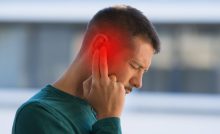Hearing naturally declines with age, and people often have one ear that hears better than the other. If hearing loss appears suddenly in one ear for no apparent reason, you may have a kind of nerve deafness called sudden sensorineural hearing loss or SHL.
According to research in the August 2019 issue of Otolaryngology-Head and Neck Surgery, there are about 70,000 new cases of SHL per year in the United States.
Table of Contents
Causes of Sudden Hearing Loss in one ear
It is not known what causes Sudden Hearing Loss, but experts point to several possible reasons including:
- Injury to the ear
- Exposure to loud noises or certain drugs
- Blockage of the ear
- Tumor
- Illness
Hearing changes can be a natural outcome of aging. Some causes are reversible, like wax buildup in the ear canal or ear infections with fluid buildup, and unfortunately, some are irreversible, like those due to problems with the function of the ear itself.
Sudden Hearing Loss can affect people of all ages, although it tends to occur most in the 50s and 60s, and usually strikes one ear.
You may hear a “pop” or feel like your ear is clogged. It’s also described as a gradual decline over several minutes or even hours, like “air leaking from a tire”.
Sudden Hearing Loss gets ignored because the symptoms feel familiar, like a head cold or earwax or water in the ear, and people try to tend it with cold or sinus medicine, swimmer’s ear drops, or by cleaning their ears.
Read more: Causes of Sudden Hearing Loss >
How is Hearing Loss in One Ear diagnosed?
How can you know the difference between a regular stuffy ear and sudden hearing loss?
Try this simple test
Hum aloud to yourself. With normal hearing, you hear the sound equally in both ears, and with a loss of hearing in one ear, the humming will shift to one side or the other. Pay attention if the humming is louder in the left ear. It suggests the right ear hearing loss is due to recent nerve damage, and that requires prompt medical attention.
According to the National Institute on Deafness and Other Communication Disorders (NIDCD), about 10%-15% of people who suffer from sudden hearing loss have an identifiable reason for their condition.
If it’s identifiable it’s important to make an appointment with the doctor, and during your visit, your symptoms and medical history will be reviewed and a physical examination of your ears, nose, and throat will be conducted. Your doctor may also order a hearing test, and a specialist known as an audiologist will measure how you respond to a range of sounds and tones at various volume levels.
These tests can help your doctor determine the part of the ear that is affected, which can provide clues as to the underlying cause of the hearing loss.
Treating sudden hearing loss in one ear, and getting your hearing back
Although treatments for sudden hearing loss are still fairly limited 85% of those who receive prompt medical attention regain some or all of their hearing.
This is mostly good news for people hoping to regain their hearing in one ear. The drugs used to treat sudden hearing loss are steroids, which suppress inflammation, specifically, corticosteroids.
They help the body fight illness, decreasing swelling and reducing inflammation. You can find them in pill form, and they can be given through an injection behind the eardrum.
Read more: Hearing Loss Treatment >
Sudden Hearing Loss in one ear and COVID-19
Viral infections are thought to be one of the most common causes of sudden hearing loss in single, and both ears, which is directly connected to the COVID-19.
The virus mainly affects the upper respiratory system causing symptoms of fever and cough, leading to pneumonia and multi-organ failure.
A large proportion of the cases seen are asymptomatic (20–86% of reported cases) or have mild unreported symptoms.
Neuronal inflammation related to COVID-19 has been reported previously in the context of anosmia, but the relationship between COVID-19 and sensorineural hearing loss has not been thoroughly explored to date.
Sudden Hearing Loss in one ear caused by injury at work
Always feel free to ask Johnson Law Offices about the process, the law, or an individual case. The legal, medical, and audio-metric questions that come into play in a hearing loss workers compensation claim can be complicated.
The claims require attention to detail mixed with an ability to work well with hearing-impaired retirees and their families, especially spouses, and their hearing health care professionals.
Read about: What Is Occupational Deafness? >






